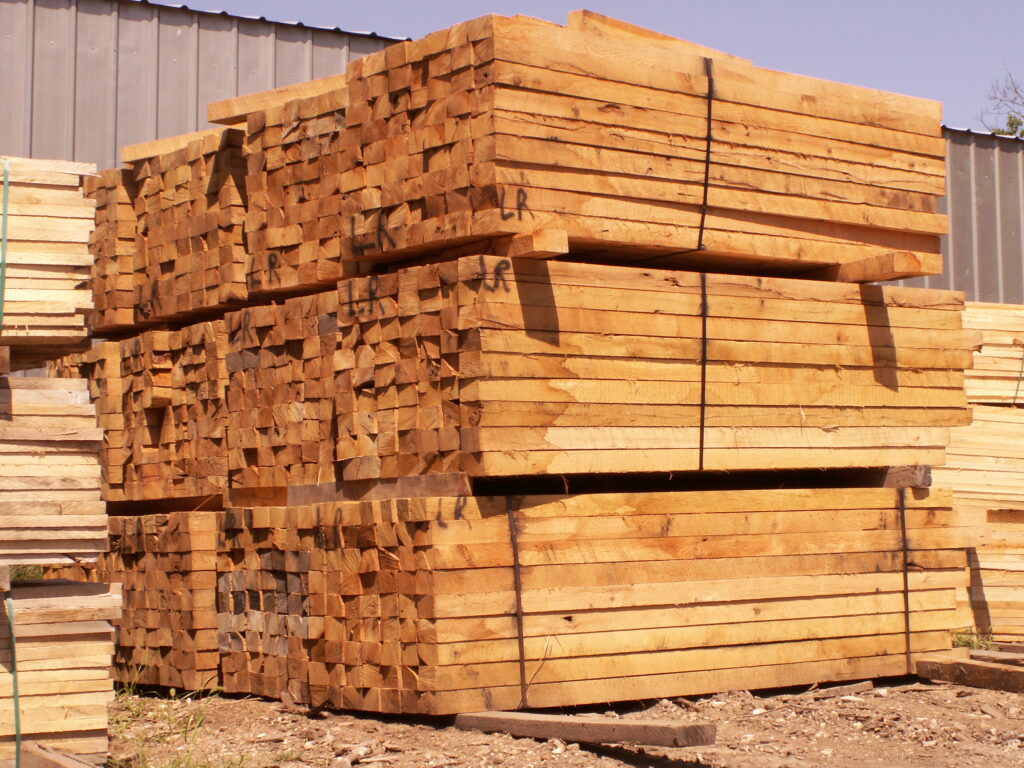2024 lumber prices stands as a key concern for industries reliant on timber, including the pallet sector. Estimated instability in lumber costs pose significant implications for the production expenses of new or milled pallets. However, amidst these challenges, the case for using recycled pallets emerges as a sustainable solution. Let’s dive into the projected lumber costs and explore why choosing used wood pallets is the best choice.
Projected 2024 Lumber Prices:
At the end of 2023, according to Trading Economics lumber was trading at $564/1000 board feet. They also predict in 2024 that the price of lumber will climb to $640/1000 board feet. The lumber market is notorious for its volatility, shaped by several factors ranging from supply chain interruptions to global economic environments. In 2024, experts predict continued fluctuations in lumber prices, driven by various underlying forces.
Supply Chain Dynamics:
Persistent supply chain disruptions, stemming from several factors including transportation challenges, continue to impact timber production and distribution. These disruptions hinder the availability of lumber, applying increasing pressure on prices. Furthermore, increased demand in construction and manufacturing sectors amplifies the strain on the lumber supply chain, contributing to price volatility.

Environmental Regulations and Sustainability Initiatives:
Increasing emphasis on environmental sustainability and strict regulations surrounding harvesting timber play a key role in affecting lumber prices. Attempts to combat deforestation and advocate for sustainable forestry methods may lead to higher compliance costs for lumber producers, in so doing impacting prices. Additionally, mounting consumer awareness regarding environmental problems drives the demand for eco-friendly options, influencing market dynamics.
Global Economic Factors:
Global economic environments, including currency variations and trade policies, drastically influence lumber prices. A strong economy typically connects with heightened demand for construction materials, driving lumber prices rising. Equally, economic downturns or trade tensions may crush demand, leading to price fluctuations.
Impact on New Pallet Costs:
The projected price fluctuations in lumber directly impact the production costs of new pallets, which primarily rely on wood as the primary material. As lumber prices soar, the expenses associated with locating raw materials and building processes increase, subsequently raising the cost of new pallets. This presents a challenge for businesses dependent on pallets for their supply chain operations, potentially impacting profitability and operational productivity.
The Case for Recycled Pallets:
Within the volatility of lumber prices and the growing costs of milled wood pallets, utilizing used wood pallets arises as a compelling replacement for businesses looking for cost-effective and sustainable solutions.

Here is why:
Cost-Effectiveness:
Used wood pallets offer a cost-effective alternative to new pallets, as these options are more affordable due to their reused condition. By opting for used pallets, businesses can significantly reduce their pallet purchasing costs without conceding on quality or performance.
Environmental Sustainability:
Used wood pallets influence environmental sustainability by stretching the lifespan of wood materials and reducing the demand for new timber. By switching pallets from landfills and promoting circular economy beliefs, businesses can show their commitment to environmental stewardship and corporate social accountability.
Durability and Reliability:
Contrary to misconceptions, recycled pallets undergo thorough inspection and repair processes to ensure durability and reliability. Through refurbishment and quality control processes, recycled wood pallets meet industry standards and perform well in supply chain operations, offering a dependable and sustainable pallet solution.
In the end, the projected lumber prices for 2024 create big challenges for businesses dependent on new wood pallets, given the associated cost tensions and market worries. However, during these trials, the use of recycled wood pallets appears as a cost-effective and sustainable solution. By adopting recycled pallets, businesses can alleviate the impact of lumber price fluctuations, reduce production expenses, and show their commitment to environmental sustainability. As we plot a course through the budding landscape of pallet procurement, choosing recycled wood pallets proves to be a wise conclusion for businesses looking to improve costs and promote sustainability in their supply chain operations.




2 Comments
Pingback: Standard Wood Pallets vs Custom Built Wood Pallets
Pingback: Recycled IBC Totes For Sale Near Me
Leave a comment